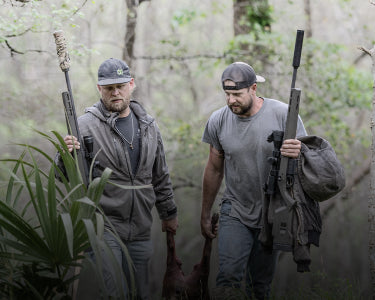
Some of the best hunting occurs right after sunrise and right before sunset, which means you might trail deep into the night and it will most likely be dark by the time you make it back to camp. Because it is easy to lose your way when there are no clear paths or obvious landmarks on land you don’t often walk, there is a chance you could get lost. It happens to even the most experienced hunters.
Most lost hunters are rescued within 24 hours, however, that does mean spending a night in the woods. With the right gear packed and the right mindset, you should do just fine a couple of nights lost in the woods. In the very beginning of the season, hunter Cory Krambule was separated from his hunting party and camp when a snowstorm made it nearly impossible to see. He spent the night in the blizzard and was rescued the next morning. About his experience, Cory says, “Don’t assume anything, take your gear, even if it’s a little bit heavier, even if you think you’re only going to be gone 15 minutes.” (Fox 13 Salt Lake City News)
Though hard statistics are difficult to find on just how many hunters a year find themselves lost, there are numbers revealing how many people get lost in our National Parks and it averages about 11 every day. So, don’t feel foolish if it happens to you. Just know what to do if it does…
How to Avoid Getting Lost While Hunting
Though mistakes and accidents are inevitable, you can better prepare and plan before heading afield to avoid getting lost in the first place.
Always follow the golden rules of wilderness survival:
- Tell someone where you are going and when to expect you back.
- Scout your hunting grounds beforehand during the day and take note of trails and landmarks and drop waypoints on your GPS unit.
- Carry a topo map, compass, a GPS and a fully charged cell phone. The Maine Department of Inland Fisheries and Wildlife suggests, “Before entering the woods—whether at an old logging road, a town or country road, or from camp itself—you should check your compass and bearings. This assures, for one thing, that you have not left the compass in another pair of pants or on the camp table. It also serves to establish the direction in which the road is running and, most important, determines the general direction or course which you must follow to return to the road from anywhere in the general area where you are to hunt.”
- Use trail markers from camp to your stand and when blood tracking.
- When you discover you’re lost, S.T.O.P.—stop, think, observe and plan. Search and Rescue says to stay in place once lost—the chances of finding you are greater if you sit tight.
- Pack the right survival gear for a night spent out in less than ideal conditions.
Hunter’s Survival Kit Checklist—15 Survival Essentials

- Appropriate clothing.
Whichever season it is, it is highly likely to get cold, if not downright freezing, when the sun goes down. Have a wool beanie, gloves and moisture-wicking warm undergarments and waterproof rain gear in your pack.
- Signaling device
This can be a mirror or whistle—just something to get the attention of searchers. Equally, you can fire off three shots spaced evenly apart.
- Compass, GPS unit and charged cell phone.
It is also very important to learn how to read a topographic map and carry it with you.
- Long-range walkie talkies if you are hunting with a group.
Check-in with each other periodically and alert others if you have fallen or have gotten lost.
- Extra batteries for your electronics.
Take an extra set of batteries for your flashlight, walkie talkie, GPS and firearm optic.
- Flashlight or headlamp.
Click here to shop flashlights.
- Fire starter and tinder.
Fire starters are lightweight and take up hardly any space. It is smart to double up or even triple up on these—a magnesium fire rod or equivalent, plus a windproof lighter, a Bic and waterproof matches.
- Survival knife or multi-tool.
- First aid kit.
Include bandages for sprains, QuikClot, insect repellent, antiseptic wipes and over-the-counter pain medication.
- Mylar emergency blanket or winter-rated sleeping bag.
It is important to stay dry to prevent hypothermia. Find or build a shelter if possible. A simple rope and tarp work in this scenario.
- Water and water filter straw.
- High-energy protein bars or non-perishable snacks like beef jerky and trail mix.
- Chemical hand and feet warmers.
- Brightly colored trail marker or tape and your required hunter orange.
You can use your safety orange as a signaling device.
- Prescription medication.
No one ventures out expecting to get lost and the survival stories of those that do usually made a rookie or foolish mistake, are overconfident in their abilities and/or ill-prepared. Canadian hunter, Brad Lambert survived 23 days lost in the woods. Let his ordeal be a lesson to you, he says, “I don’t plan to hunt alone again. I think about it differently now. I’ll hunt only in familiar woods, and I intend to buy a satellite phone. And I’ll always carry extra fuel and food from now on.”



